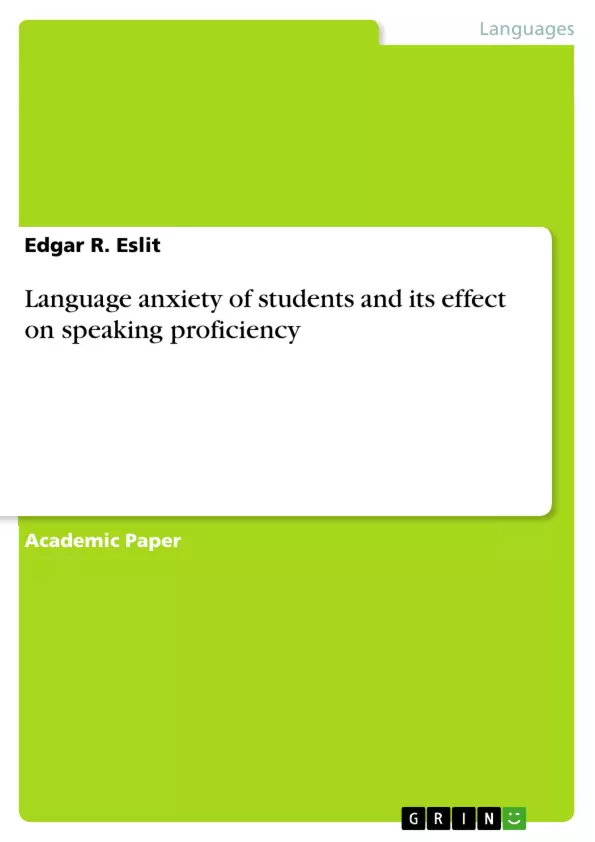Language researchers advanced the idea that Foreign Language Anxiety (FLA) has been a discussion of so much interest for it impairs language proficiency among students.
The purpose of this study was to find out the level of students’ language anxiety and its effect on speaking proficiency. It was carried out among the forty-one Bachelor of Science in Hotel and Restaurant Management (BSHRM) students of Mindanao State University-Maigo School of Arts & Trades (MSU-MSAT). Quantitative and qualitative research methods were employed. Data was collected using Horwitz et.al and Educational Testing Services materials. Furthermore, the mean and standard deviation was observed. These were carried out further using the Multiple Linear Regression procedure to determine the effects of the respondents’ level of language anxiety in relation to speaking proficiency.
Results revealed that the respondents’ communication apprehension and negative evaluation had a high anxiety level. Respondents’ high level of anxiety affected the way they communicate in English. On this premise, a Communication Enrichment Program was proposed to address the oral communication problem of the respondents.
Table of Contents
- Introduction
- Theoretical Framework
- Conceptual Framework
- Statement of the Problem
- Methodology
- Results and Discussion
- Conclusion
- Recommendations
Objectives and Key Themes
This thesis investigates the level of language anxiety among students and its impact on their speaking proficiency. The study aims to identify specific aspects of language anxiety that contribute to communication difficulties, specifically within the context of English language learning.
- The impact of language anxiety on speaking proficiency
- The relationship between students' demographic profile and their level of language anxiety
- The development of a communication enrichment program to address the challenges posed by language anxiety
- The application of quantitative and qualitative research methods to understand the phenomenon of language anxiety
- The use of established theories in second language acquisition, social learning, and foreign language anxiety to frame the study.
Chapter Summaries
- Introduction: This chapter establishes the significance of English language proficiency in the contemporary world, emphasizing its importance in academic and professional settings. It introduces the concept of Foreign Language Anxiety (FLA) as a major obstacle to effective communication in a second language, highlighting its impact on students' performance.
- Theoretical Framework: This chapter presents the theoretical foundations of the study, drawing upon established theories in second language acquisition, social learning, and foreign language anxiety. These theories provide a framework for understanding the complex relationship between language anxiety, language learning, and speaking proficiency.
- Conceptual Framework: This chapter outlines the specific research questions, variables, and methodology of the study. It presents a schematic paradigm illustrating the interrelationship between students' demographic profile, language anxiety, and speaking proficiency.
- Statement of the Problem: This chapter outlines the research problem, stating the primary objective of the study to determine the language anxiety level of students and its effect on speaking proficiency. It also presents specific research questions focused on identifying the profile of the respondents and the level of their language anxiety in various domains.
- Methodology: This chapter provides a detailed description of the research design, including the sample size, data collection methods, and data analysis techniques. It describes the use of quantitative and qualitative approaches, including the specific instruments and procedures employed.
- Results and Discussion: This chapter presents the findings of the study, focusing on the analysis of data collected through surveys, interviews, and speaking assessments. The results are interpreted in relation to the research questions and theoretical framework, highlighting the relationship between language anxiety and speaking proficiency.
Keywords
The study focuses on the key concepts of Foreign Language Anxiety, cognitive function, language learning, speaking proficiency, and enrichment programs. It explores the influence of language anxiety on students' communication skills and the development of a communication enrichment program to address the challenges posed by this phenomenon.
- Citar trabajo
- Edgar R. Eslit (Autor), 2020, Language anxiety of students and its effect on speaking proficiency, Múnich, GRIN Verlag, https://www.grin.com/document/593846



